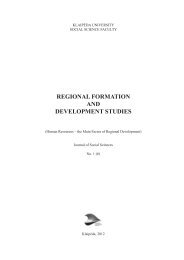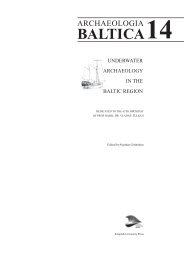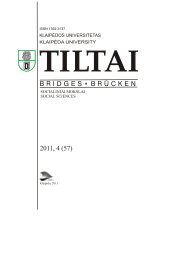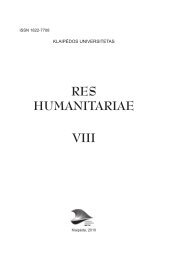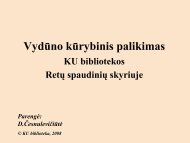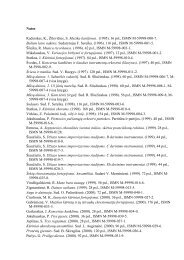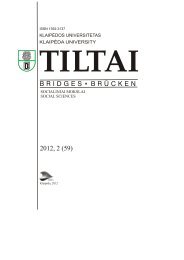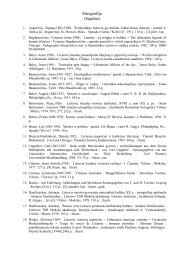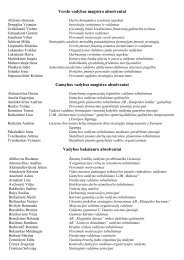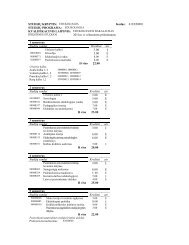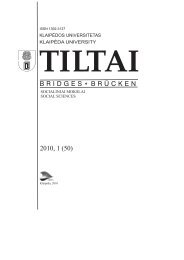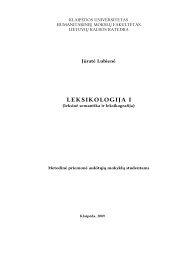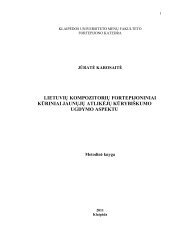BALTICA10
BALTICA10
BALTICA10
Create successful ePaper yourself
Turn your PDF publications into a flip-book with our unique Google optimized e-Paper software.
NATIONALISM AND POLITICS IN THE RECOVERY<br />
OF PAST ASTRONOMIES<br />
STEPHEN C. MCCLUSKEY<br />
Abstract<br />
Since its origins, archaeoastronomy has been influenced by nationalist traditions in archaeology. This paper addresses the<br />
consequences of these political influences, considering several important questions: To what extent is this quest for past<br />
astronomies influenced by nationalist political agendas? How should those of us studying past astronomies respond to these<br />
external pressures? To what extent is comparatively recent ethnographic and folkloric evidence suitable for the recovery of<br />
past astronomies? The author considers that awareness of these influences and limitations is essential for any scholarly attempt<br />
to recover past astronomies.<br />
Key words: nationalism, colonialism, imperialism, cultural identity, historiography, folklore, ethnography, romanticism,<br />
tourism, cultural revival.<br />
ARCHAEOLOGIA BALTICA 10<br />
Introduction<br />
As the Conference Announcement says: “The purpose<br />
of the round table discussion is to propose a critical<br />
examination of the value and limitations of astronomical<br />
and cosmological traditions found in folklore, archaeology,<br />
and the historical records used sometimes<br />
as evidence for national or cultural identity. How (or<br />
whether) we can reconstruct past astronomical practices<br />
and cosmological knowledge from the limited<br />
evidence we have at hand? Our goal is to frame the<br />
problem and prepare further discussions.”<br />
I would like to address the aspect of this topic dealing<br />
with the possible influences of local, regional, or<br />
national agendas on the integrity of our work. I was<br />
drawn to this idea as I became concerned about the<br />
faint scent of nationalist agendas in some of the presentations<br />
that I’d seen of late, both at conferences and in<br />
submissions to the journal, Archaeoastronomy. I kept<br />
recalling Olaf Pedersen’s comments (1982, p.269) on<br />
the history of archaeoastronomy at Oxford I, where he<br />
noted how archaeoastronomy was discredited for decades<br />
by its association with the nationalist search for<br />
the ancient German origins of astronomy. He closed<br />
his critique with the comment that “today ‘archaeoastronomy’<br />
does not have any mythical function – or<br />
does it?”<br />
Since archaeoastronomers have, in the last forty years,<br />
been fully conscious of the epistemological ambiguities<br />
of our reconstructions of past astronomies and our<br />
attempts to place those astronomies in their cultural<br />
contexts, we must also be sensitive to the various pressures<br />
in our modern contexts which may push us to<br />
create popular illusions.<br />
Pedersen’s questioning of archaeoastronomy’s role in<br />
the creation of national mythology invites a critical<br />
examination of the value and limitations of folklore,<br />
archaeology, and the historical record as evidence for<br />
a nation’s astronomical traditions. Several traditions of<br />
historical, archaeological, and anthropological criticism<br />
can contribute to this discussion.<br />
Critiques of Nationalist Scholarship<br />
One of the most strident historiographical critiques of<br />
the myth of the nation in history is that of the American<br />
medievalist, Patrick Geary. He presented the influence<br />
of nationalism upon history – and for that matter, the<br />
contributions of historians to nationalism – as both an<br />
absolute evil and as an ethical challenge to historians<br />
(2002, p.15):<br />
[I]t has turned our understanding of the past into a<br />
toxic waste dump, filled with the poison of ethnic nationalism,<br />
and the poison has seeped deep into popular<br />
consciousness. Cleaning up this waste is the most<br />
daunting challenge facing historians today.<br />
The British historian, Eric Hobsbawm, pointed out the<br />
logical connection between historical practice and the<br />
spread of nationalist ideologies in an invited plenary<br />
address to the American Anthropological Association<br />
(1992, p.3):<br />
For historians are to nationalism what poppy-growers<br />
in Pakistan are to heroin-addicts: we supply the essential<br />
raw material for the market… What makes a nation<br />
is the past, what justifies one nation against others is<br />
the past, and historians are the people who produce it.<br />
VII<br />
VII. ARCHAEO-<br />
LOGY,<br />
FOLKLORE AND<br />
THE RECOVERY<br />
OF PAST<br />
ASTRONOMIES<br />
263



